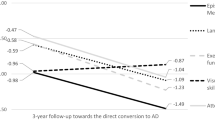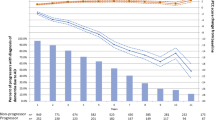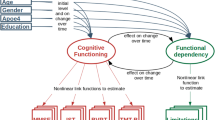Abstract
The goal of the current study was to examine cognitive change in both healthy controls (n = 229) and individuals with mild cognitive impairment (MCI) (n = 397) from the Alzheimer’s Disease Neuroimaging Initiative (ADNI). We applied latent growth modeling to examine baseline and longitudinal change over 36 months in five cognitive factors derived from the ADNI neuropsychological test battery (memory, executive function/processing speed, language, attention and visuospatial). At baseline, MCI patients demonstrated lower performance on all of the five cognitive factors when compared to controls. Both controls and MCI patients declined on memory over 36 months; however, the MCI patients declined at a significantly faster rate than controls. The MCI patients also declined over 36 months on the remaining four cognitive factors. In contrast, the controls did not exhibit significant change over 36 months on the non-memory cognitive factors. Within the MCI group, executive function declined faster than memory, while the other factor scores changed slower than memory over time. These findings suggest different patterns of cognitive change in healthy older adults and MCI patients. The findings also suggest that, when compared with memory, executive function declines faster than other cognitive factors in patients with MCI. Thus, decline in non-memory domains may be an important feature for distinguishing healthy older adults and persons with MCI.


Similar content being viewed by others
References
Albert, M. S., Jones, K., Savage, C. R., Berkman, L., Seeman, T., Blazer, D., et al. (1995). Predictors of cognitive change in older persons: MacArthur studies of successful aging. Psychology and Aging, 10(4), 578–589.
Albert, M. S., Moss, M. B., Tanzi, R., & Jones, K. (2001). Preclinical prediction of AD using neuropsychological tests. Journal of the International Neuropsychological Society, 7(5), 631–639.
Albert, M. S., DeKosky, S. T., Dickson, D., Dubois, B., Feldman, H. H., Fox, N. C., et al. (2011). The diagnosis of mild cognitive impairment due to Alzheimer's disease: recommendations from the National Institute on Aging-Alzheimer's Association workgroups on diagnostic guidelines for Alzheimer's disease. Alzheimer's & Dementia, 7(3), 270–279.
Bennett, D. A., Wilson, R. S., Schneider, J. A., Evans, D. A., Beckett, L. A., Aggarwal, N. T., et al. (2002). Natural history of mild cognitive impairment in older persons. Neurology, 59(2), 198–205.
Buckner, R. L. (2004). Memory and executive function in aging and AD: multiple factors that cause decline and reserve factors that compensate. Neuron, 44(1), 195–208.
Carter, S. F., Caine, D., Burns, A., Herholz, K., & Lambon Ralph, M. A. (2011). Staging of the cognitive decline in Alzheimer's disease: insights from a detailed neuropsychological investigation of mild cognitive impairment and mild Alzheimer's disease. International Journal of Geriatric Psychiatry.
Chou, C.-P., Yang, D., Pentz, M. A., & Hser, Y.-I. (2004). Piecewise growth curve modeling approach for longitudinal prevention study. Computational Statistics & Data Analysis, 46(213–225).
Dowling, N. M., Hermann, B., La Rue, A., & Sager, M. A. (2010). Latent structure and factorial invariance of a neuropsychological test battery for the study of preclinical Alzheimer's disease. Neuropsychology, 24(6), 742–756.
Folstein, M. F., Folstein, S. E., & McHugh, P. R. (1975). Mini-mental state. A practical method for grading the mental state of patients for the clinician. J Psychiat Res, 12, 189–198.
Garner, W. R., Hake, H. W., & Eriksen, C. W. (1956). Operationism and the concept of perception. Psychological Review, 63(3), 149–159.
Gomar, J. J., Bobes-Bascaran, M. T., Conejero-Goldberg, C., Davies, P., & Goldberg, T. E. (2011). Utility of combinations of biomarkers, cognitive markers, and risk factors to predict conversion from mild cognitive impairment to Alzheimer disease in patients in the Alzheimer's disease neuroimaging initiative. Archives of General Psychiatry, 68(9), 961–969.
Goodglass, H., & Kaplan, E. (1983). The assessment of aphasia and related disorders. Philadelphia: Lea & Febiger.
Hayden, K. M., Reed, B. R., Manly, J. J., Tommet, D., Pietrzak, R. H., Chelune, G. J., et al. (2011). Cognitive decline in the elderly: an analysis of population heterogeneity. Age and Ageing, 40(6), 684–689.
Hedden, T., & Gabrieli, J. D. (2004). Insights into the ageing mind: a view from cognitive neuroscience. Nature Reviews Neuroscience, 5(2), 87–96.
Hodges, J. R., Erzinclioglu, S., & Patterson, K. (2006). Evolution of cognitive deficits and conversion to dementia in patients with mild cognitive impairment: a very-long-term follow-up study. Dementia and Geriatric Cognitive Disorders, 21(5–6), 380–391.
Hsu, H. C., & Jones, B. L. (2012). Multiple Trajectories of Successful Aging of Older and Younger Cohorts. Gerontologist, 1–14.
Hu, L., & Bentler, P. M. (1999). Cutoff criteria for fit indices in covariance structure analysis: conventional versus new alternatives. Structural Equation Modeling, 6, 1–55.
Kaplan, E., Goodglass, H., & Wintraub, S. (1982). The Boston Naming Test (2nd ed.). Philadelphia: Lea and Febiger.
Kramer, J. H., Nelson, A., Johnson, J. K., Yaffe, K., Glenn, S., Rosen, H. J., et al. (2006). Multiple cognitive deficits in amnestic mild cognitive impairment. Dementia and Geriatric Cognitive Disorders, 22(4), 306–311.
Laird, N. M., & Ware, J. H. (1982). Random-effects models for longitudinal data. Biometrics, 38(4), 963–974.
Leoutsakos, J. M., Muthen, B. O., Breitner, J. C., & Lyketsos, C. G. (2012). Effects of non-steroidal anti-inflammatory drug treatments on cognitive decline vary by phase of pre-clinical Alzheimer disease: findings from the randomized controlled Alzheimer's Disease Anti-inflammatory Prevention Trial. International Journal of Geriatric Psychiatry, 27(4), 364–374.
Manly, J. J., Tang, M. X., Schupf, N., Stern, Y., Vonsattel, J. P., & Mayeux, R. (2008). Frequency and course of mild cognitive impairment in a multiethnic community. Annals of Neurology, 63(4), 494–506.
Matsuda, O., & Saito, M. (2009). Multiple cognitive deficits in patients during the mild cognitive impairment stage of Alzheimer's disease: how are cognitive domains other than episodic memory impaired? International Psychogeriatrics, 21(5), 970–976.
McArdle, J. J. (1986). Latent variable growth within behavior genetic models. Behavior Genetics, 16(1), 163–200.
McArdle, J. J. (1988). Dynamic but structural equation modeling of repeated measures data. In J. R. Nesselroade & R. B. Cattell (Eds.), The handbook of multivariate experimental psychology, Vol. 2 (pp. 561–614). New York: Plenum Press.
McArdle, J. J., & Prindle, J. J. (2008). A latent change score analysis of a randomized clinical trial in reasoning training. Psychology and Aging, 23(4), 702–719.
Morris, J. C. (1993). The Clinical Dementia Rating (CDR): current version and scoring rules [see comments]. Neurology, 43(11), 2412–2414.
Morris, J. C., Heyman, A., Mohs, R. C., Hughes, J. P., van Belle, G., Fillenbaum, G., et al. (1989). The Consortium to Establish a Registry for Alzheimer's Disease (CERAD), I: clinical and neuropsychological assessment of Alzheimer's disease. Neurology, 39, 1159–1165.
Morris, J. C., Storandt, M., Miller, J. P., McKeel, D. W., Price, J. L., Rubin, E. H., et al. (2001). Mild cognitive impairment represents early-stage Alzheimer disease. Archives of Neurology, 58, 397–405.
Mungas, D., Beckett, L., Harvey, D., Farias, S. T., Reed, B., Carmichael, O., et al. (2010). Heterogeneity of cognitive trajectories in diverse older persons. Psychology and Aging, 25(3), 606–619.
Muthén, B. O. (1997). Latent variable modeling with longitudinal and multilevel data. In A. Raftery (Ed.), Sociological methodology (pp. 453–480). Boston: Blackwell Publishers.
Muthén, B. O., & Curran, P. J. (1997). General longitudinal modeling of individual differences in experimental designs: a latent variable framework for analysis and power estimation. Psychological Methods, 2, 371–402.
Muthén, L. K., & Muthén, B. O. (1998–2010). Mplus user's guide: Sixth Edition. Los Angeles, CA: Muthén & Muthén. http://pages.gseis.ucla.edu/faculty/muthen/vita1.html
Negash, S., Smith, G. E., Pankratz, S., Aakre, J., Geda, Y. E., Roberts, R. O., et al. (2011). Successful aging: definitions and prediction of longevity and conversion to mild cognitive impairment. The American Journal of Geriatric Psychiatry, 19(6), 581–588.
Nordlund, A., Rolstad, S., Gothlin, M., Edman, A., Hansen, S., & Wallin, A. (2011). Cognitive profiles of incipient dementia in the Goteborg MCI study. Dementia and Geriatric Cognitive Disorders, 30(5), 403–410.
Perry, R. J., & Hodges, J. R. (1999). Attention and executive deficits in Alzheimer's disease. A critical review. Brain, 122(Pt 3), 383–404.
Petersen, R. C., Doody, R., Kurz, A., Mohs, R. C., Morris, J. C., Rabins, P. V., et al. (2001). Current concepts in mild cognitive impairment. Archives of Neurology, 58(12), 1985–1992.
Petersen, R. C., Aisen, P. S., Beckett, L. A., Donohue, M. C., Gamst, A. C., Harvey, D. J., et al. (2010). Alzheimer's Disease Neuroimaging Initiative (ADNI): clinical characterization. Neurology, 74(3), 201–209.
Raz, N., & Kennedy, K. M. (2009). A systems approach to the aging brain: Neuroanatomic changes, their modifiers, and cognitive correlates. In W. Jagust & M. D'Esposito (Eds.), Imaging the aging brain (pp. 43–70). New York: Oxford University Press.
Raz, N., Gunning, F. M., Head, D., Dupuis, J. H., McQuain, J., Briggs, S. D., et al. (1997). Selective aging of the human cerebral cortex observed in vivo: differential vulnerability of the prefrontal gray matter. Cerebral Cortex, 7(3), 268–282.
Reitan, R. M. (1958). Validity of the Trailmaking Test as an indication of organic brain damage. Perceptual and Motor Skills, 8, 271–276.
Rey, A. (1964). L'Examen Clinique en Psychologie. Paris: Presses Universitaires de France.
Rosen, W. G., Mohs, R. C., & Davis, K. L. (1984). A new rating scale for Alzheimer's disease. The American Journal of Psychiatry, 141(11), 1356–1364.
Salthouse, T. A. (2011). Neuroanatomical substrates of age-related cognitive decline. Psychological Bulletin, 137(5), 753–784.
Salthouse, T. A., & Ferrer-Caja, E. (2003). What needs to be explained to account for age-related effects on multiple cognitive variables? Psychology and Aging, 18(1), 91–110.
Steiger, J. H. (1989). EZPATH: A supplementary module for SYSTAT and SYGRAPH. Evanston: Systat.
Stoel, R. D., van Den Wittenboer, G., & Hox, J. (2003). Analyzing longitudinal data using multilevel regression and latent growth curve analysis. Metodologia de las Ciencias del Comportamiento, 5, 1–21.
Strauss, M. E., Thompson, P., Adams, N. L., Redline, S., & Burant, C. (2000). Evaluation of a model of attention with confirmatory factor analysis. Neuropsychology, 14(2), 201–208.
Twisk, J. W. R. (2003). Applied longitudinal data analysis for epidemiology: A practical guide. New York: Cambridge University Press.
Wechsler, D. A. (1981). Wechsler adult intelligence scale - revised. New York: Psychological Corporation.
Wechsler, D. A. (1987a). Wechsler adult intelligence scale - revised. New York: Psychological Corporation.
Wechsler, D. A. (1987b). Wechsler memory scale - revised. San Antonio: Psychological Corporation.
Weiner, M. W., Aisen, P. S., Jack, C. R., Jr., Jagust, W. J., Trojanowski, J. Q., Shaw, L., et al. (2011). The Alzheimer's disease neuroimaging initiative: progress report and future plans. Alzheimer's & Dementia, 6(3), 202–211. e207.
Wilson, R. S., Beckett, L. A., Barnes, L. L., Schneider, J. A., Bach, J., Evans, D. A., et al. (2002). Individual differences in rates of change in cognitive abilities of older persons. Psychology and Aging, 17(2), 179–193.
Winblad, B., Palmer, K., Kivipelto, M., Jelic, V., Fratiglioni, L., Wahlund, L. O., et al. (2004). Mild cognitive impairment–beyond controversies, towards a consensus: report of the International Working Group on Mild Cognitive Impairment. Journal of Internal Medicine, 256(3), 240–246.
Acknowledgements
We gratefully acknowledge a conference grant from the National Institute on Aging (NIA) (R13 AG030995, PI: Mungas) that facilitated data analysis for this project.
Dr. Johnson was supported by NIA grant R01 AG022538 (PI: Johnson). Dr. Gross was supported by a National Institutes of Health Translational Research in Aging fellowship (T32AG023480-07) and NIA grant P01 AG031720 (PI: Inouye). Dr. McLaren was supported by NIA grants P01 AG036694 (PI: Sperling) and K23 AG027171 (PI: Atri). Dr. Pa was supported by NIA grant K01 AG034175 (PI: Pa). Dr. Park was supported by NIA grant R01 AG031252 (PI: Farias). Dr. Manly was supported by NIA grants R01 AG028786 (PI: Manly) and R01 AG037212 (PI: Mayeux).
Data collection and sharing for this project was funded by the Alzheimer's Disease Neuroimaging Initiative (ADNI) (National Institutes of Health Grant U01 AG024904). ADNI is funded by the National Institute on Aging, the National Institute of Biomedical Imaging and Bioengineering, and through generous contributions from the following: Abbott; Alzheimer’s Association; Alzheimer’s Drug Discovery Foundation; Amorfix Life Sciences Ltd.; AstraZeneca; Bayer HealthCare; BioClinica, Inc.; Biogen Idec Inc.; Bristol-Myers Squibb Company; Eisai Inc.; Elan Pharmaceuticals Inc.; Eli Lilly and Company; F. Hoffmann-La Roche Ltd and its affiliated company Genentech, Inc.; GE Healthcare; Innogenetics, N.V.; Janssen Alzheimer Immunotherapy Research & Development, LLC.; Johnson & Johnson Pharmaceutical Research & Development LLC.; Medpace, Inc.; Merck & Co., Inc.; Meso Scale Diagnostics, LLC.; Novartis Pharmaceuticals Corporation; Pfizer Inc.; Servier; Synarc Inc.; and Takeda Pharmaceutical Company. The Canadian Institutes of Health Research is providing funds to support ADNI clinical sites in Canada. Private sector contributions are facilitated by the Foundation for the National Institutes of Health (www.fnih.org). The grantee organization is the Northern California Institute for Research and Education, and the study is coordinated by the Alzheimer's Disease Cooperative Study at the University of California, San Diego. ADNI data are disseminated by the Laboratory for Neuro Imaging at the University of California, Los Angeles. This research was also supported by NIH grants P30 AG010129, K01 AG030514, and the Dana Foundation.
The contents do not represent the views of the Dept. of Veterans Affairs, the United States Government, or any other funding entities.
Author information
Authors and Affiliations
Consortia
Corresponding author
Additional information
Data used in preparation of this article were obtained from the Alzheimer’s Disease Neuroimaging Initiative (ADNI) database (adni.loni.ucla.edu). As such, the investigators with the ADNI contributed to the design and implementation of ADNI and/or provided data but did not participate in the analysis or writing of this report. A complete listing of ADNI investigators can be found at: http:/adni.loni.ucla.edu/wp-content/uploads/how_to_apply/ADNI_Acknowledgement_List.pdf
Rights and permissions
About this article
Cite this article
Johnson, J.K., Gross, A.L., Pa, J. et al. Longitudinal change in neuropsychological performance using latent growth models: a study of mild cognitive impairment. Brain Imaging and Behavior 6, 540–550 (2012). https://doi.org/10.1007/s11682-012-9161-8
Published:
Issue Date:
DOI: https://doi.org/10.1007/s11682-012-9161-8




